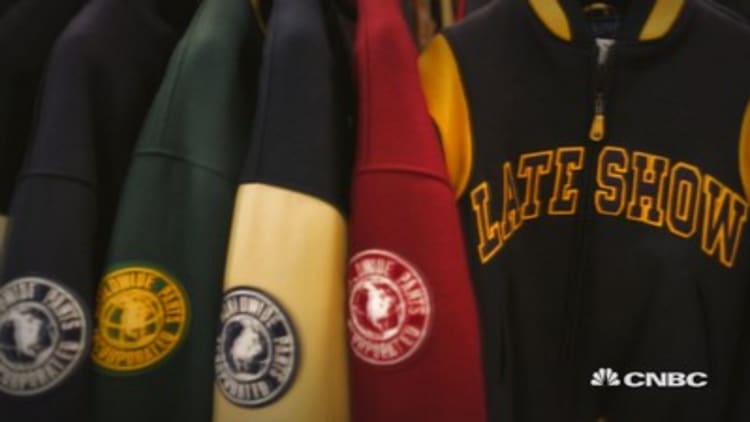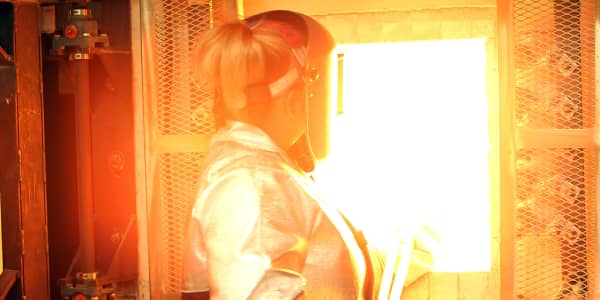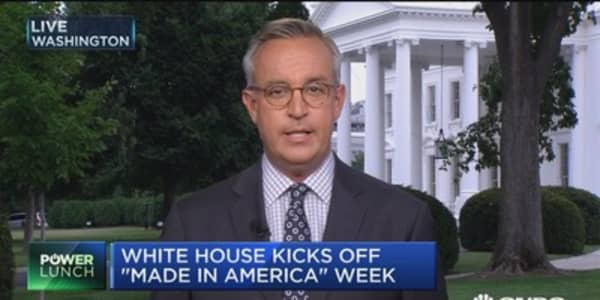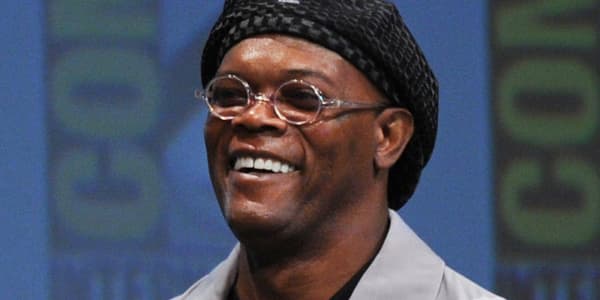With July Fourth approaching and Memorial Day just past, patriotism is in full bloom. It's arguably the best time for manufacturers and other companies to promote American-made products.
"Now is the season for 'Made in USA,' " said Sarah Wagner, editor and founder of "USA Love List." Wagner has been sourcing and hunting for unique "Made in USA" goods for her website for more than three years.
But amid conversations about reshoring and more domestic manufacturing, the process behind "Made in USA" labeling can be opaque.
The latest in the label drama: Country singer Carrie Underwood. The former "American Idol" winner is featured in a "Simply American" advertising campaign. Almay's homepage encourages fans to use the hashtag "#simplyamerican" for social media posts.
The problem is that "Simply American" suggests Almay's beauty products are made domestically, said Bonnie Patten, executive director of Truth in Advertising.org, a nonprofit organization. While a company spokeswoman says nearly 90 percent of Almay products, including makeup remover, are American made, other products are made in China, the Czech Republic, Germany and Canada. Truth In Advertising.org has complained to the Federal Trade Commission and New York Attorney General's Office about what it says are Almay's false claims.
To be fair, the Revlon-owned Almay brand does not appear to have violated labeling requirements, and it is diligent about labeling the origins of its products. Beyond the ad campaign, Almay packaging details which specific countries the products are made including components' origins.
But using a broad definition of "American" can often run the risk of raising red flags.
Blogger Wagner said she recently saw a set of American flags for sale with the label language, "Proudly 'Made in USA,' assembled in China." What does that even mean?
"The Almay Simply American campaign captures the essence of the 'American Beauty Look,' which is simple, luminous and fresh faced," according to Revlon, in a statement emailed to CNBC.com. "Simply American does not imply, nor intend to imply, made in the USA."
But Truth In Advertising.org's Patten argues false-packaging claims hurt the efforts of companies that do make "Made in USA" a top priority. "Patriotism is a great marketing tool," she said. "Consumers are more likely to buy products marketed as made in the U.S. and are willing to spend more money."
Read More'Made in China' becoming increasingly 'Made in USA'
Companies large and small have discovered the potential in showcasing a product's evolution, including its manufacturing origins.
Apple's iPhone is designed by Apple in California, and assembled in China.
Retail catalogs and e-commerce sites feature lengthy product descriptions. Artisanal, one-of-a-kind backpacks and canoes made from regional materials and decades-old craftsmen traditions. Words like "heritage" and "authentic" come up a lot.
Such language in part implies that the goods generate American manufacturing jobs. In recent years, the narrowing labor cost gap between the U.S. and other countries including China, and cheaper energy prices have helped support American manufacturing. Especially after the Great Recession, more Americans began connecting the dots that foreign-made goods—piled high in big box-store carts—equals fewer U.S. jobs.
Tell me a story
In fact, both American and Chinese consumers are willing to pay at least a 10 percent premium for "Made in USA" goods, including baby food, appliances, electronics and apparel, according to research from the Boston Consulting Group.
Read MoreWhy the 'Made in China' model is weakening
But the lure of the iconic "Made in USA" label is about more than manufacturing math, and the inference of quality and safety.
American-made labeling appeals to consumers' appetite for shopping, wrapped in feel-good packaging. We want to buy stuff, and more of it. Product-specific knowledge feels cool and "insidery." It makes consumers feel special.
"People love to hear stories about the products they use," Wagner explained. "It adds something interesting to their purchase." Her most popular blog posts include details on state-specific "Made in USA" goods.
This growing story-behind-the-product strategy has helped launch makers of handmade goods on online platforms including Etsy. The Brooklyn-based company, which went public in April, features many American-made products. Of course you want a crafted, wooden cheese board—in the shape of your home state.
But unpacking the nuts and bolts of "Made in USA" labeling is complicated. And sometimes there's outright labeling fraud.
"What we're seeing is a lot of false made-in-America labeling," said Hal Sirkin, senior partner at the Boston Consulting Group.
Fake American-made labeling got on Sirkin's radar about two years ago. Details have emerged about customs officials unpacking presumably American-made flags actually made in China—with the word "flag" misspelled as "flagg."
And in some instances, it can be tougher in one state than another for companies to secure American-made tagging, given the vagaries of labeling guidelines and their interpretation.

Labels explained
The Federal Trade Commission has "Made in USA" guidance for companies.
What does "Made in USA" mean?
If a company wants to make a "Made in USA" claim, the guideline states "all or virtually all" of the product has been made in America.
The FTC considers other factors, including how much of the product's total manufacturing costs can be assigned to U.S. parts and processing.
What does "Assembled in USA" mean?
If a product carries the label, "Assembled in the USA," it must have undergone a "substantial transformation" on U.S. soil, according to the FTC.
But as Wagner points out, words like "substantial" and "virtually all" leave room for interpretation among manufacturers.
Variations on "Made in USA," including "designed in" and "assembled in," are good signs suggesting where something is made is influencing consumer choices. "That's a sign that 'made in America' matters," said BCG's Sirkin. "Companies want to have it on their box."
What's happening with American-made guidance in California?
Current state law prohibits companies from making "Made in USA" claims unless each and every part comes from the U.S. State legislators are reviving a debate to allow businesses to use the iconic label if "virtually all" of a product's parts are made in the U.S.—basically lower than the current state threshold.
What about label compliance?
The FTC can take action against companies that make false or misleading product claims.
But no agency can police every product on the market.
I've seen several versions of "Made in USA" seals. What's going on?
Beyond federal guidelines, privately owned organizations have emerged with their own branded, American-made certification processes and seals of approval. They sometimes charge a fee for their proprietary certification.
An FTC spokeswoman and the office of New York Attorney General Eric Schneiderman declined to comment on the Almay-specific complaint.
A Nashville-based publicist for singer Underwood did not respond to requests for a response.
Revlon also said, "Almay's packaging clearly states their sources and complies with FTC rules regarding 'Made in USA.' "
In the end, the "Made in USA" label debate is likely to grow and evolve. Said Sirkin of BCG: "People want to know whether a product is made in America."
Read MoreAmerican manufacturing and welding to women: We want you!
UPDATED: This story has been updated to include additional manufacturing facts about Almay.





